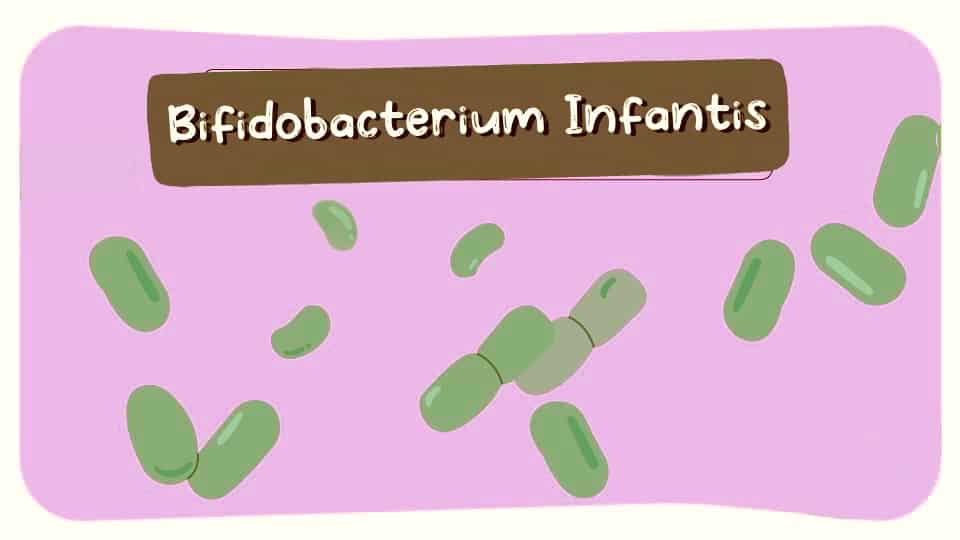3 Bifidobacterium Infantis Health Benefits: Infants And Breast Milk

Bifidobacterium Infantis is a gram-positive, spore-forming type of probiotic bacteria that belongs to the Bifidobacteriaceae family.
The strain is usually found in both the gastrointestinal tract and feces of humans which shows it's ability to survive in the human microbiome.
Here are 3 human health benefits of Bifidbacterium Infantis below.
1. Treats Malnourished Infants
Malnourished infants are babies who suffer from inadequate intake of essential nutrients, leading to poor growth, weakened immune system, and increased vulnerability to diseases.
A 2022 study authored by Michael J. Barratt, administered Bifidobacterium infantis along with human milk oligosaccharides to infants. Administration of Bifidobacterium infantis EVC001 along with human milk oligosaccharides promoted weight gain and reduced intestinal inflammation markers in infants with Severe Acute Malnutrition.
2. Promotes Infants Microbiota
Infant microbiota refers to the collection of microorganisms, including bacteria, viruses, and fungi, that inhabit the gastrointestinal tract and other body sites of infants during the early stages of life.
A 2015 review authored by Mark A Underwood, researched Bifidobacterium infantis for digestion and consumption of human milk prebiotics.
It found human milk oligosaccharides play a crucial role in shaping the infant's intestinal microbiota with lifelong consequences, Bifidobacterium longum subspecies infantis can digest and consume HMOs which enhance the infant's intestinal microbiota.
3. Improves Breast Milk Quality
Breast milk is a natural and nutrient-rich fluid produced by lactating women, specifically designed to provide optimal nutrition and essential antibodies to nourish and support the healthy growth and development of infants.
A 2022 study authored by Sarah Bajorek, established Bifidobacterium infantis EVC001 could increase in the abundance of bifidobacteria capable of metabolizing human breast milk oligosaccharides.
It showed that B. infantis EVC001 holds substantial potential as a valuable tool for improving the gut health and nutritional outcomes of preterm infants.
Can Bifidobacterium Infantis 35624 Help With Psoriasis?
Bifidobacterium infantis 35624 can help with Psoriasis according to a 2013 study authored by David Groeger.
According to the study, oral administration of Bifidobacterium infantis 35624 for 6-8 weeks resulted in beneficial immunoregulatory effects in patients with psoriasis.
The administration of B. infantis 35624 led to a reduction in plasma levels of C-reactive protein (CRP), tumor necrosis factor α (TNF-α), and interleukin-6 (IL-6), which are pro-inflammatory biomarkers associated with psoriasis.
This indicates that B. infantis 35624 has the potential to help modulate the inflammatory response in patients with psoriasis and suggests its potential value in managing non-gastrointestinal inflammatory conditions like psoriasis.
Can Adults Take Bifidobacterium infantis?
Adults can take Bifidobacterium infantis. While Bifidobacterium infantis is widely recognized for its benefits in infant health, this probiotic strain also holds potential advantages for adults.
Research suggests that incorporating B. infantis into the adult diet may help alleviate symptoms associated with various gastrointestinal issues, such as irritable bowel syndrome (IBS), bloating, and gas.
Bifidobacterium infantis vs Bifidobacterium longum?
Bifidobacterium infantis and Bifidobacterium longum are different species within the Bifidobacterium genus. B. infantis is commonly found in breastfed infants and has a unique ability to digest human milk oligosaccharides (HMOs).
B. longum, on the other hand, is present in both infants and adults, offering broad-spectrum benefits. Despite their differences, genome sequencing data reveals a high level of genetic similarity between the two species.
Dr. Sara Mesilhy has a Master’s degree in Gastroenterology and holds a membership with the Royal College of Physicians of the United Kingdom. She completed her Bachelor of Medicine, Bachelor of Surgery (MBBS) at Cairo University and is currently part of the ProbioticReviewGirl medical team.